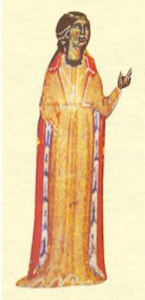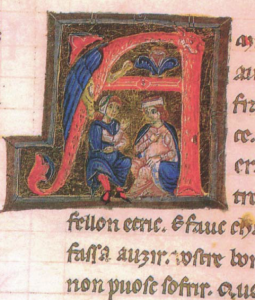(Comtessa de Dia – Paris, Bibliotheque Nationale MS fr. 12473)
After finishing out a long semester, I just turned in grades, and completed all those other tasks “to maken vertu of necessitee,” so now I get to once again turn towards a project I have been dabbling in and very much enjoy working on – the trobairitz and their cansos. Last time I looked to their pieces I translated and analyzed the last of Castelloza’s, and I will now return to the Comtessa de Dia.
So much has already been written about Comtessa de Dia’s life and history, this post will focus solely on the content of one of her four cansos’s “Fin ioi me don’ alegranssa” which remains consistent with the tradition of naming the piece after the first line of the canso. Here is my translation followed by a brief analysis:
Fin ioi me don’ alegranssa
Per qu’eu chan plus gaiamen,
E no m’o teing a pensanssa,
Ni a negun penssamen,
Car sai que son a mon dan
Fals lausengier e truan,
E lor mals diz non m’esglaia:
Anz en son dos tanz plus gaia.
En mi non an ges fianssa
Li lauzengier mal dizen,
C’om non pot aver honranssa
Qu’a ab els acordamen;
Qu’ist son d’altrestal semblan
Com la niouls que s’espan
Qe.l solels en pert sa raia,
Per qu’eu non am gent savaia
E vos, gelos mal parlan,
No.s cuges que m’an tarzan,
Que iois e iovenz no.m plaia,
Per tal que dols vos deschaia.
Fine joy gives me great happiness
Which makes me sing more gaily,
And it weighs me not to think
Nor have any dark thoughts
For fear of the harm
False gossipers may bring,
Their bad words don’t slay me:
They only make me twice as gay.
In me they will find no alliance
Those bad worded gossipers,
As no one can have honor
Who works in accordance to them;
They resemble well
Like the clouds that span
The sun to lose its rays,
For of one like that I want no knowledge
And you, jealous ill speaking one,
Don’t believe that I will tarry
With joy and youth myself to please
If for only to undo you.
The first line of “Fin ioi me don’ alegranssa” provides more than the title, and establishes the tone, beginning with the first word, “fine,” which can be read as refined, or elevated and serves as the beginning of the concept of fin’amor, courtly love. Here, however, there is only courtly joy. After discussing the problematic nature of fin’amor previously, in this instance the concept becomes simultaneously more complicated and yet simplified. Comtessa de Dia shrugs off the notion of ennobling love, with all that that actually entails, and blatantly asserts her greatest happiness is derived from joy (that perhaps also carries another connotation I have discussed elsewhere and will revisit shortly).
The joy she receives appears to be almost cathartic, where she smirks at the words of those who speak ill of her. She relies on this very gossip to lend her an air of superiority. She does not hide behind false veils of piety and renounce the gossipers, accusing them of bringing her low and ruining her goodly reputation. Instead, her power is ironically derived from their very words and her concession to them as she ends the canso with poise, assuring her husband, “gelos mal parlan” (jealous ill speaking one), of her intentions to continue forth with her activities. By not engaging or challenging the gossipers with negations, she gives them no power over her, and thus gains the upper hand.
On an unrelated, but interesting side note, I love the use of the word “lausengier” for gossiper. It bears resemblance to lozenge, or an elixir to ease the throat, implying that these gossipers soothe their throats through the very act of gossiping, essentially creating an unending cycle where the cure for a sore throat that arises from all that ill intended talk is more of it. I have not yet proven a concrete etymological connection, but I can’t help think it is more than just a coincidence.
The implied joi/jeu duality from the first line becomes perhaps the most apparent as it carries through to the end. Comtessa, much like Castelloza uses here cansos as a form of puppetry, mimicking male dominated troubadour traditions that use chansons to derive virtue for the speaker, while acting as a virtuoso pulling at the strings of both her lover and her audience in a game not unlike that of cat and mouse. Her je m’en fiche attitude recasts her joy outside the borders of sin, and places it squarely within a world where the crucial distinction between fin’amor and adultery collapse, further brining to question the perceived purity associated with fin’amor. Can this absolute state of innocent love also be so naïve as to condone and even legitimize carnal sin? Does fin’amor thus become debased as it is used towards ends and via means that remain ultimately unjustified? Obviously these are larger questions for an entire genre of works, and well outside my scope here, but they are inescapable in a conversation that centers around understanding compunction, or lack thereof.
As Comtessa closes her canso she tells the jealous one she wishes to preoccupy herself with joy and youth, directly contrasting these traits with her current arrangement that is presumably anything but, and therefore reversing blame, or at least ameliorating it. Even so, the audience is left with the troublesome knowledge that regardless of circumstances, she is nevertheless committing adultery. To better explain the ways in which she navigates this tricky situation I will argue that fin’amor does not become debased, but rather always already existed as a crutch for devising a method to superimpose divergent concepts such as love and lust while ignoring those places that display friction. The backdrop for such manipulation is a palimpsest ripe for erasure and recreation where the lover plays cartographer of human relationships and may reconfigure the relief to suit his or her own needs, regardless of the resulting distortion. In this imagined realm idealized love is no more real than the topography of emotions erected in ink that appear most real simply by virtue of being. Thus the disparity between the reality of an illicit relationship and the fabricated ideals of pure love becomes muddled and neglected as they combine into a single idea, and fin’amor is born ex nihilo as the concept to fill this gap in reasoning, all the while negating its ontological roots.
Withal, I would like to propose yet another interpretation for Comtessa’s usage of the concept that also defies logical explanation, but which needs none. Even as her very last line appears scornful and perhaps malicious, even as she relies on techniques of false love to make her argument, when the entirety of the piece is read as another strophe within a game, it mollifies the tone.
Thus in her game Comtessa elicits sympathy from her audience, all the while positioning her lover as it pleases her to stir gossipers for her own ends as she upends all those who judge her in a superb cycle of crafted emotions. In the end she does not undo her husband, but rather, by shedding light on the inherent fallacies of the larger system, she undoes the entire concept of fin’amor.
Sources:
Huchet, Jean-Charles. “Les femmes troubadours ou la voix critique.”
Paden, William. The Voice of the Trobairitz: Perspectives on the Women Troubadours.
Shapiro, Marianne. “The Provencal Trobairitz and the Limits of Courtly Love.”


